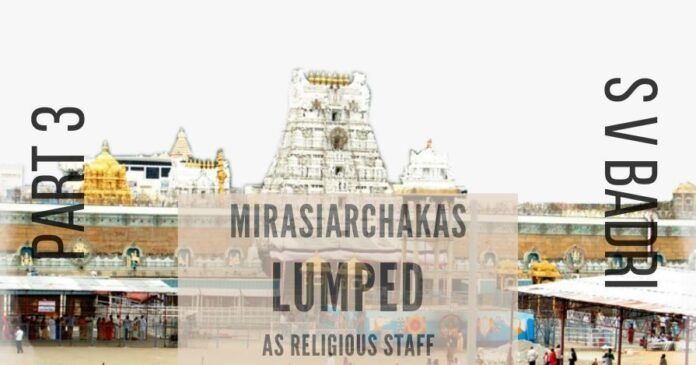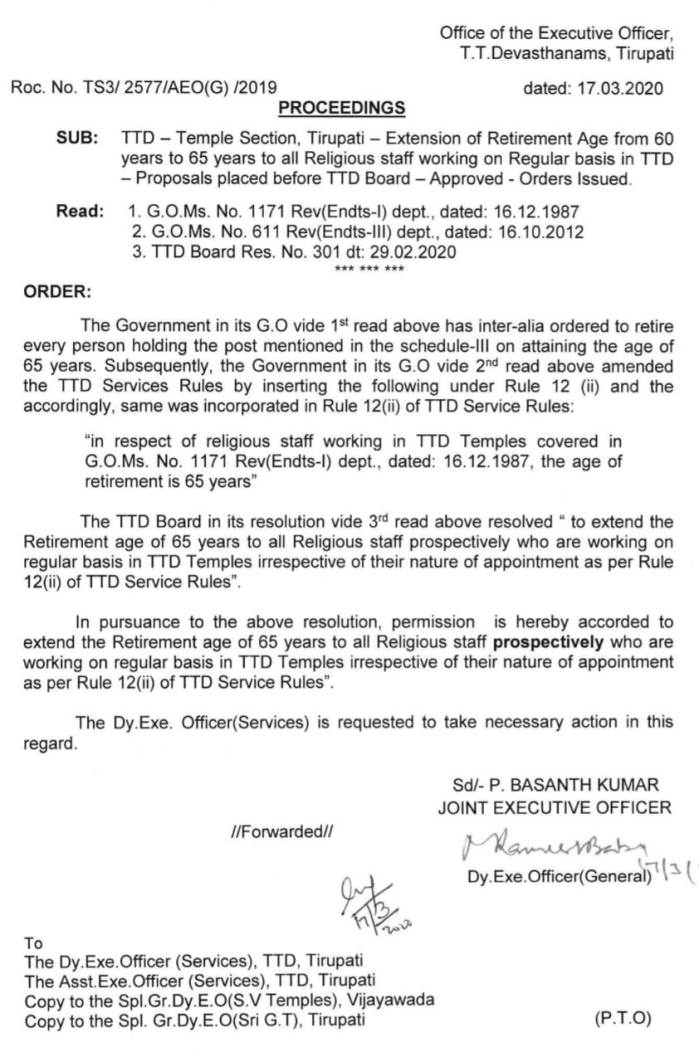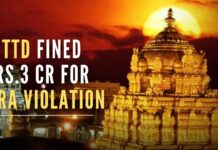
Parts 1 and 2 of this series can be accessed here. This is Part 3.
Position in 2006
TTD decides to engage erstwhile Mirasidars as Archakas on Sambhavana Basis on Feb 10, 2006, in the Padmavathi Ammavaru Mandir, Tiruchanur.
In 2007, the Government of AP makes the following amendment:
Amendment Act 33 of 2007 to Act 30 of 1987 enabling qualified members of erstwhile hereditary Archaka families to continue to have right of Archakatvam. Sub-Section (3) of Section 34.
It states:
“(3) Notwithstanding anything contained in sub-sections (1) and (2) of this section, the qualified members of those Archaka families which were continuing in Archakatvam service under the provisions of the repealed The Andhra Pradesh Charitable and Hindu Religious Institutions and Endowments Act, 1966 and recognized as such by the competent authority shall continue to have the right to archakatvam without having any right to emoluments such families used to receive earlier under Act 17 of 1966. However, they shall receive emoluments in accordance with the scheme under Section 144.” (emphasis mine)
(My Note: Therefore, families serving the Bhagawan or Ammavaru as Archakas prior to the Act of 1966 cannot be stopped from rendering their Kainkaryam as per the SC order in IA 4 of 1997)
Section 144 was also amended by Act 33 of 2007 w.e.f. Jan 03, 2008, introducing two provisos. While the main part of Section144 abolished shares in Hundi and other Rusums, the 2nd Proviso empowered the Commissioner to frame a separate scheme stipulating conditions of service and payments of emoluments to the Archakas, Officeholders, and servants of the Institution.
(My Note: This Section 144 and the framing of Separate Scheme is an important development).
Therefore, even after the hereditary Mirasi stands abolished, the Courts paved way for the Hereditary Archakas as under:
“Thus, notwithstanding the abolition of hereditary rights in MirasidarArchakas, if an Archaka was a member of an Archaka family, and was qualified to be an Archaka and was continued as an Archaka under Act 17 of 1966, and was also recognized as Archaka by the competent authority, he was held entitled to have the right of Archakatvam but not to the emoluments which he had received earlier under Act 17 of 1966. He would get only those emoluments laid down in a scheme to be framed by the Commissioner of Endowments under Section 144.”
STATEMENT OF THE POSITION AFTER ACT 33/2007 BY THE SUPREME COURT ON Feb 19, 2013
After the amendments were made to Section 34 and to Section 144 of Act 30 of 1987 by Act 33 of 2007, some of the review petitions seeking review of the decision in A.S. Narayana Dikshitulu were dismissed as infructuous / withdrawn on Feb 19, 2013, by a Three-Judge Bench of the Supreme Court observing that during the pendency of the review petitions, the State of Andhra Pradesh, by making such amendments to the principal Act (introducing sub-section(3) to Sec34 and adding 2nd proviso to Sec.144 by Act 33 of 2007) had restored the status of Archakas as was obtained prior to the enactment of Act 30 of 1987. However, it was made clear that the said order will not affect the reference to the larger Bench made in A. Ramaswamy Dikshitulu.
(Note: This once again confirms that the MirasiArchakas have to be restored to their earlier status as was obtained before the enactment of Act 30 of 1987 and those families serving as MirasiArchakas before the Act of 1966 as per the HC as well as the SC).
Here come the devious designs of the TTD and AP Government to take control of the GarbhaGruham.
Bear in mind that the following points:
- The Pradhana Archaka used to be from the four families of the Hereditary ArchakaMirasi families on a term basis called Vantu as decided amongst themselves.
- They had under them the ArchakaGumasthas, who had no hereditary rights.
- The Gamekars were responsible for the Prasadams and the Potu workers making these Prasadams used to come under them.
- Peddajeeyangar and Chinnajeeyangar are religious heads under the Matham established by Bhagawad Ramanuja.
Package Scheme
The erstwhile MirasiArchakas were offered regular employment as Archakas by the TTD. They refused to be employees. All they wanted was the restoration to their earlier position with honour, dignity, and a Sambhavana for the performance of their religious responsibilities. They specifically didn’t want an employer-employee relationship with the TTD. They were continued to be allowed to do the Kainkaryam.
Based on Amended Act 33 of 2007, with an amendment to Sections 34(3) and 144 a Scheme was framed by TTD which was duly approved under TTD Board Resolution No:2 dated Jul 17, 2010. And in the Scheme, a Sambhavana of around 55,000/month was granted by the TTD based on the Pujas, rituals each one renders. The Sambhavana was termed as a Package Scheme for the erstwhile MirasiArchakas.
What the TTD did next was a devious plan to ease out these four families of erstwhile hereditary MirasiArchakas.
- The package scheme was worked out for Hereditary Archakas, Peddajeeyangar and Chinnajeeyangar.
- TTD took all the non-hereditary ArchakaGumasthas as Archakas in the regular employment of the TTD. The remuneration fixed was an average Rs.100,000 per month.
- This was a windfall for the ArchakaGumasthas. Since there position was non-hereditary, they jumped into accepting the offer, so a division was cunningly created inside the GarbhaGruham.
- By doing away with the families that served for 41 generations completely with the illegal age rule, TTD can now have absolute control of the GarbhaGruham through these pliant employee Archakas.
The Potu workers involved in making the Prasadams for the Bhagawan raised a red flag. They demanded that their grievances should be addressed similar to the ArchakaGumasthas. TTD offered to take them as employees under Service Rules 12(1).
TTD put its next plan into action. This is where most devious twist by TTD and AP Government comes into play:
- In 2012, G.O.Ms.No.611 dt. Oct 16, 2012 was issued by the Government of Andhra Pradesh amending Tirumala Tirupathi Devasthanams Employees’ Service Rules, 1989.
- In 2013, two ArchakaMirasdars from the Tirupatamma Family, Sriman A.S. Narasimha Dikshitulu, and Sriman Ramachandra Dikshitulu, Tirumala Mandir were compulsorily retired.as also Sriman Bhaktavatsalam of Padmavati Mandir. They went to HC against this retirement and the HC issued an interim order restoring their Archakatvam without Sambhavana or any emoluments. However, TTD Board resolved to give Sambhavana for all the three and they were restored their right to perform archakatvam in compliance of the interim order of the HC.
- Under the G.O. 611, the posts of Potu Supervisor, Potu Worker (Junior) in T.T.D. Employees’ Service Rules were included.
- In addition, in Rule 12 of G.O.Ms.No.1060, dt. Oct 24, 1989, the original rule was numbered as sub-rule (1) and a sub-rule numbered as sub-rule (2) was added which stated “In respect of religious staff working in T.T.D. temples covered in G.O.Ms.No.1171, Revenue (ENDTS.I) Department, dt.Dec 16, 1987, the age of retirement is 65 years”. (G.O.611, G.O.1060 & G.O. 1171 attached)
What has the TTD and the AP Government done with this? Have they elevated the Potu workers by calling them, religious staff? Their idea is totally different.
- They have now equated the roles of MirasiArchakas, Non-Hereditary ArchakaGumasthas, now elevated and taken into employment as Archakas, Prasadam making Potu workers, PeddaJeeyangar, ChinnaJeeyangar and CLUBBED them into one category called “Religious Staff”.
- Now, the retirement age of the original 58 that was increased to 60 has become 65.

TTD has started applying “this retirement age of 65 rule” to the members of the 4 families of MirasiArchakas.
To be continued in Part-4…
G O No. 1060 by PGurus on Scribd
G O No. 611 by PGurus on Scribd
G O No. 1171 by PGurus on Scribd
- Can we do it, please? - August 21, 2023
- Coaching Beyond – My days with Indian Cricket Team - June 28, 2023
- Who Killed SSR? – A book review (SSR-Sandeep Singh Rajput) - April 5, 2023










